Thomas de Hartmann: Orchestral Music, Volume Two
The music of the Ukrainian-born Thomas de Hartmann (1884–1956) is only now beginning to be rediscovered, almost seven decades after his death. The two works receiving their first recordings here reveal a major late-Romantic voice, downstream from Tchaikovsky, a student of Arensky and Taneyev, contemporary of Rachmaninov, and alert to the discoveries of Stravinsky and Prokofiev. The Symphonie-Poème No. 1 – a musical cousin of Rachmaninov’s Second Symphony – occupies a vast canvas and requires a correspondingly huge orchestra, generating a monumental sense of scale from essentially balletic material. The lighter Fantaisie-Concerto for double bass and orchestra moves from tangy dissonance via a tuneful slow movement to a perky, folk-inspired finale.
Leon Bosch, double bass (Tracks 4–7)
Lviv National Philharmonic Orchestra of Ukraine
Theodore Kuchar, conductor
Listen To This Recording:
- I Lento
- II Scherzo
- III Andante
- IV Finale
- I Allegro con brio
- II Romance 1830: Adagio
- III Finale: Allegro commodo
Symphonie-Poème No. 1, Op. 50 (1934)
Fantaisie-Concerto for double bass and orchestra, Op. 65 (1942–44)
FIRST RECORDINGS
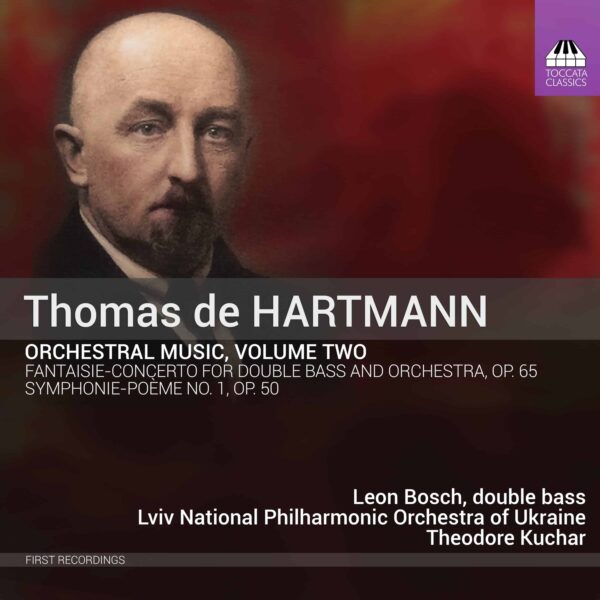
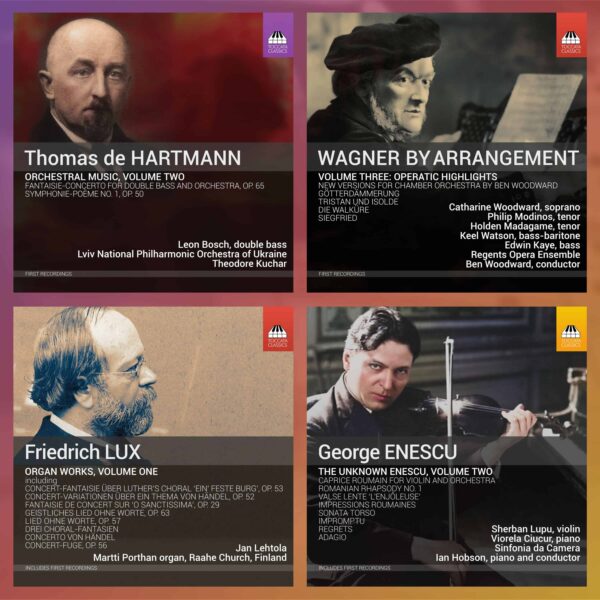
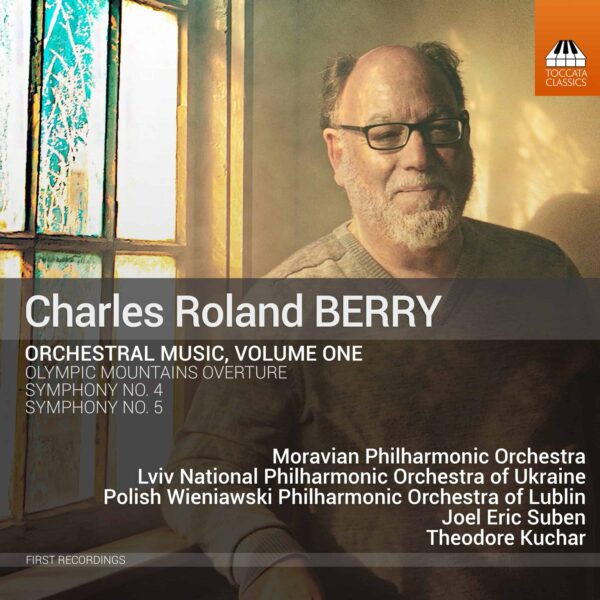
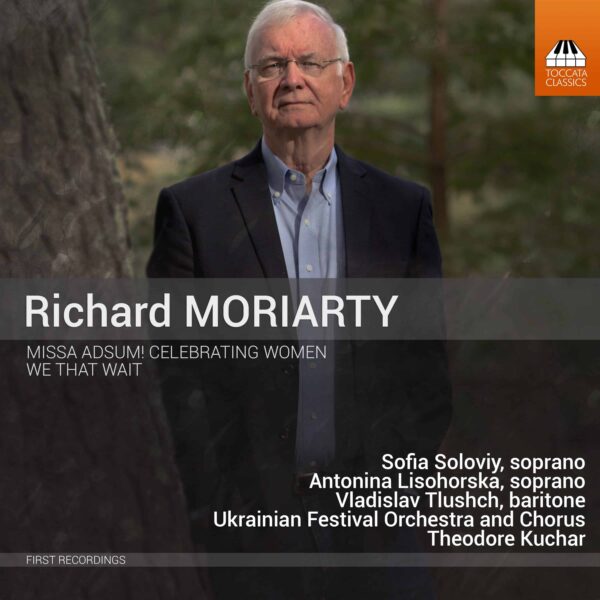
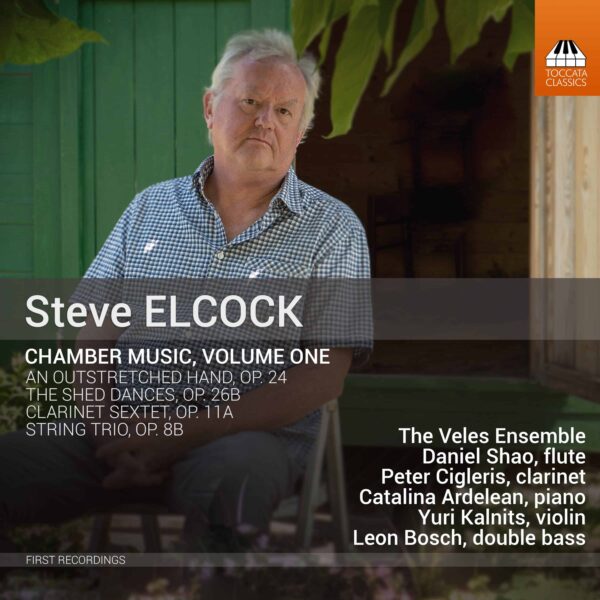
MusicWeb International :
‘Overall, this is a hugely interesting symphony, uniquely orchestrated with occasional moments of breath-taking beauty […]Coupled with an unusual concerto, both of which are performed with tremendous panache and dedication by the Lviv National Philharmonic Orchestra under Theodore Kuchar and all captured in glorious sound, this release is highly recommendable, both to listeners who enjoy early twentieth century romantic symphonies, as well as those curious to discover the music of de Hartmann.’
—Lee Denham, MusicWeb International
MusicWeb International :
‘[…] I wondered if Toccata Classics had managed to unearth yet another major yet forgotten work [The Symphonie-Poème No 1]. The simple – and rather wonderful – answer is yes […]
This is certainly a major work [The Symphonie-Poème No 1] and a rewarding listen for anyone who has a taste for large-scale symphonic works written in a post-Romantic idiom. Praise too for the performance of the Lviv National Philharmonic Orchestra of Ukraine under Theodore Kuchar and the work of producer-engineer Andriy Mokrytskiy. Clearly this is a work unknown to the wider world prior to this recording which was part of a three concert ‘festival’ and associated sessions in Lviv. The orchestra play with an ideal combination of virtuosity and style. Interestingly, it does not sound like an Eastern European orchestra – with the wind and brass (yes there really is brass!) well-blended and balanced and the strings warm and rich. Kuchar is well-known to collectors for his wide and critically acclaimed discography and this is an important addition to it. This is a wholly convincing interpretation with Kuchar moulding this potentially discursive and unusual work into an impressive whole.[…]
Hartmann orchestrates with real flair and individuality [Fantasie-Concerto for double-bass and orchestra, Op 6] which is well-caught again by the impressive engineering on this disc.’
—Nick Barnard, MusicWeb International
MusicWeb International :
‘Nick Bernard’s recordings of the year
As mentioned above Toccata’s ability to discover remarkable but unknown music is astonishing. The symphony here is large at over 65 minutes, sprawling at times but written with a unique and passionate voice. Performed with the conviction and high skill it requires this was as unexpected as it was compelling.’
—Nick Barnard, MusicWeb International
MusicWeb International :
‘Lee Denham’s recordings of the year
My first nomination for this year’s Recordings of the Year [is] Thomas de Hartmann. […] I […] am a great admirer of this work and if you too enjoy music in the style of the early twentieth century Russian Romantic School of Rachmaninov, Prokofiev and Glazunov, this is well worth discovering – and it is wonderfully played by the Lviv National Philharmonic Orchestra.’
—Lee Denham, MusicWeb International
Scherzo :
‘La Sinfonía-Poema nº 1 (1934), el gran descubrimiento de esta grabación, es una partitura monumental que, a lo largo de cuatro movimientos, transita –y ese es su gran atractivo – por territorios estilísticos imprevisibles donde pueden percibirse ecos e influencias de Rimsky-Korsakov, Scriabin, Rachmaninov o Prokofiev (incluso semejanzas con Respighi) a través de una orquestación extremadamente coloreada que aúna, además de grandes secciones de cuerda, viento y percusión, dos arpas, celesta, piano a cuatro manos y tres saxofones. […]
Bosch, Kuchar y los músicos ucranianos brindan versiones entusiastas –y muy bien grabadas– de ambas composiciones: los aficionados a explorar tierras vírgenes no deberían perdérselas’
—Juan Manuel Viana, Scherzo, February 2024
Pizzicato :
‘Theodore Kuchar conducts both works committedly and the Lviv orchestra’s playing is powerful and sonorous. British-South African double bassist Leon Bosch plays at a high level and can make his instrument sing enchantingly’
—Remy Franck, Pizzicato
The Ultimate Classical Music Guide by Dave Hurwitz :
‘If you like big, hairy, extravagant, wildly colourful orchestral music symphony type things, BUY THIS! GET IT NOW! […]
This is so much fun, we really don’t have the right to have this much fun, do we?! […] you know it’s going to be good because Kuchar is in charge. […]
[Symphonie-Poème No. 1, Op. 50] is very interesting sonically. […] The scherzo has a gorgeous trio section with just a succulent, magnificent melody. And a beautiful slow movement […] it’s very listenable. It’s captivating timbrly. The orchestrion is so colourful. There are some very interesting sounds. […] the Lviv philharmonic here, boy do they play! Oh my god they blast their way through it! And Kuchar really keeps it moving. […] It doesn’t have any dead spot. That’s what is so exciting about this music, it tends to just keep on going. And you don’t get tired of it even when it’s slow or seems to be rather static, it is always something interesting happening. Adn the sonics are tremendous, oh my gosh it’s amazing! You’re going to love it.
And the double bass concerto is delicious. […] It’s really a captivating piece. It’s full of good tunes. It really shows off the instrument. It doesn’t hide the fact it’s a double bass. […] And it is very, very well played here by Leon Busch who’s just a terrific soloist. His upper register is beautiful and singing, it’s not raspy and irritating. He knows how to make his instrument sings beautifully, but he’s not scared to dig in and like scare the daylights out of you where Hartmann just asked him to. It’s fun. It’s a fun piece, a wonderful work. […]
If you like the Russian school, especially the 20th century Russian school and Kuchka, the mighty handful, Borodin and Glazunov and those people, you going to LOVE THIS Thing! You absolutely going to LOVE THIS Thing! It’s just bold and exciting and captivating and it will knock your socks off!’
David Hurwitz, The Ultimate Classical Music Guide by Dave Hurwitz
Arcana :
What’s the story?
Toccata Classics continues its exploration of orchestral music by Thomas de Hartmann with first recordings for two of his most characteristic works, idiomatically realized by the most fervent of present-day advocates and further confirming the intrinsic value of this composer.
What’s the music like?
[…] [First movement of Symphonie-Poème No,1] brooding introduction presages its synthesis of fantasia and fugue with an underpinning of sonata form to result in a construct as diverse in musical content as it feels cumulative in its overall design.
That the composer continued from here says much for his ambition, but the work does justify itself as a totality – whether in a Scherzo that unfolds as continually evolving structure rather than the usual ternary form, an Andante whose recourse to martial rhythm and Ukrainian folk -music gives it a distinctive colouring and emotional affect. […] this is a major inter-war work as well warrants its belated revival.
So, too, does the Fantaisie-Concerto which de Hartmann wrote with the double-bass […]
Does it all work?
Yes, though the larger work will likely take a few listens for its overall coherence to become manifest. That it does so is owing primarily to the conviction of de Hartmann’s thinking, but also to that of Theodore Kuchar in having the measure of this opulent score and conveying it to the musicians of the Lviv National Philharmonic Orchestra, who almost always sound unfazed by its demands. The concerto benefits from the expertise of Leon Bosch, affirming this as among a handful of pieces that establish the double bass as a concertante instrument in its own right.
Is it recommended?
Indeed – not least as the orchestral sound has been so sympathetically captured, detailed and spacious in equal measure, with informative notes by Elan Sicroff and Evan A. MacCarthy on life and work respectively. Cordially recommended, with the third instalment keenly awaited.’
—Richard Whitehouse, Arcana
Klassisk Mussik :
‘Den kanskje mest imponerende musikalske oppdagelsen jeg har gjort de siste ti årene eller så er verkene til den ukrainsk-fødte eksilkomponisten, Thomas de Hartmann (1884-1956). […]
Jeg vet ikke hvor kjent Lviv National Philharmonic Orchestra of Ukraine var med dette til tider filmisk levende verket før innspillingen, gjort i september 2021, men de fremfører det med stor innlevelse og fortrolighet. En stor del av æren for dette må tilskrives dirigenten Theodore Kuchar, som holder hele byggverket sammen.’
‘Perhaps the most impressive musical discovery I have made in the last decade or so is the work of the Ukrainian-born exile composer, Thomas de Hartmann (1884-1956). […]
I don’t know how familiar the Lviv National Philharmonic Orchestra of Ukraine was with this sometimes cinematically vivid work before the recording, made in September 2021, but they perform it with great empathy and familiarity. Much of the credit for this must go to conductor Theodore Kuchar, who holds the whole edifice together.’
—Guy Rickards, Klassisk Mussik
American Record Guide :
‘Theodore Kuchar, chief conductor of the Lviv Philharmonic since May 2022, gives solid energy, pulse, and precision to the opening movement, making it even balletic. […] The movement’s structure has many sections and junctures, yet with Kuchar it hangs together rhythmically and emotionally and becomes yet more gripping in the final fugue. […]
Final reflections: Hartmann’s powers at orchestration are one of the best things about him. […] What fool ever said that classical music is dying!’
—French, American Record Guide
Classical Net :
‘2025 Keep On Listening Awards
{de Hartmann] was also a really, really good composer. his Symphonie-Poème No. 1 and the Fantaisie-Concerto for Double Bass and Orchestra with Leon Bosch double bass, the Lviv National Symphony Orchestra of Ukraine, under the redoubtable Theodore Kuchar, who couldn’t make a bad record if he tries, he’s just a fantastically musical conductor and he can put over strange and interesting and wonderful repertoire as though we’ve known it all of our lives and he has or seems to have. Its on toccata Classics and it’s FANTASTIC. Thos de Hartmann is really a guy you wanna know. It’s fantastical Russian decedent. And I think that’s all we need to say to signal its universal appeal. Lots of fun. Big, huge exciting, gorgeous…. wonderful stuff. Definitely a find. Major discovery.’
—David Hurwitz, Classical Net